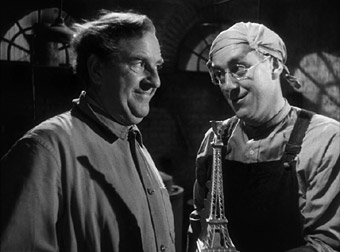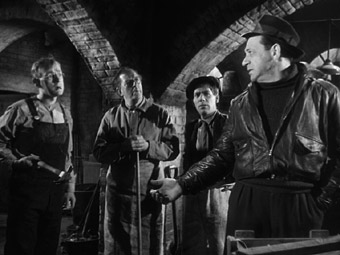|
The
term classic is a tricky beast, thrown around like critical
confetti when referring to older films and applied willy-nilly
to pretty much every comedy that Ealing Studios turned out
during its golden period. It's not hard to see why. Collectively
these films are cinema to be treasured, and boast more
invention, better performances and more genuinely funny
scenes than the combined weight of just about every comedy
film made in the UK since about 1980, and maybe earlier
(I'm unwilling to go too far back on the strength of Life
of Brian alone). The Lavender Hill Mob
has proved a particular nostalgic favourite and to revisit
it after a gap of several years is to be happily reminded
of why. And odd though it may seem for an old cynic like me
to say, but a sizeable part of its immense charm lies not
in any rule-breaking daring, but in it's quintessential
Englishness.
Alec
Guinness plays Holland, a pedantically efficient bank employee
whose principal task is to oversee the transportation of
gold bars from the smelting house to the bank, a job he
has been doing with contented efficiency for twenty years.
But his unassuming appearance conceals a secret dream, to
steal the gold and spirit it out of the country, allowing
him to enjoy a lazily luxurious retirement. We're led to believe at the film's start that he
eventually succeeds – the opening scene finds him in a South
American bar, where his cheques are instantly and enthusiastically
cashed and generous tips are handed out to just about everyone
who passes. The rest is all flashback, a story told to his
bar-room companion of how this humble bank employee came
to mastermind the biggest gold robbery in British history.

Holland's
first task is to devise a method of smuggling the loot out
of the country, which he finds thanks to Pendlebury (Stanley
Holloway), a newly arrived fellow tenant at The Balmoral
Private Hotel, a grandly named guest house and forerunner
to the abode inhabited by Guinness and his gang in
Ealing's The Ladykillers four years later.
Pendlebury runs a company that makes Eiffel Tower shaped paperweights,
which are cast in lead and then painted gold for export
to France (itself an amusing but still valid concept – during
the last World Cup I wondered just how many of those patriotic
sports fans who stuck little English flags on their cars
took the trouble to see what country they were made in).
Pendlebury is weary of his trade and it doesn't take much
to get him on board. All they need now
is a couple of professional criminals to assist with the
robbery and transportation, for which they effectively advertise
by having loud conversations in public places about
a safe with a faulty lock and the money that lies unprotected
within. The ruse lands them accomplices in the shape of
professional thieves Shorty (Alfie Bass) and Lackery (Sid
James).
While a lack of realism might handicap other films, Ealing comedies
embraced and made a virtue of it. The England of Ealing
is a land of almost fairytale innocence, where the police
are never too sharp and the criminals are likeable and trustworthy
to a man. Only in an Ealing
comedy would a burglar like Lackery take a packed lunch on a job in case
he has to stay hidden for an extended period, carry his
press clippings to impress potential employers, cheerfully
exchange robbery stories with a fellow criminal, or be unable
to go to France to collect his share of the loot because
his wife won't let him. The police are quaintly slow off
the mark, never connecting a gold robbery in which Holland
was the chief witness to the gold coloured statues being
exported by a man who lodges at the same address, and
investigating Detective Farrow (John Gregson) has to hear the word "France"
on three separate occasions before
he realises that there might actually be a connection.
The film's most famous sequence is a visual tour de force,
as Holland and Pendlebury arrive at the latter's Eiffel
Tower souvenir shop to discover that a number of the gold
statues have been sold to a party of English
schoolgirls. As the pair run down the stairs of the tower,
their panic mutating into giggling hysteria and articles
of clothing discarded and caught magically by the wind,
the tower itself rotates around the camera in a dizzying
combination of camera movements, effects
work and niftily designed sets, which on the big screen must have left audiences as
brain-boggled as the two characters. This drift towards
farce includes a lunatic sequence at the French customs,
and reaches a peak with the one girl who refuses to sell
her statue back to the two men – as they follow her, the
absurdity of the odds stacked against them just continues
to build, leading to a scene in which they somehow manage
to give an army of determined police the slip at a packed
exhibition in the Hendon police training school.

The
casting and performances are a delight. Alec Guinness's
mild mannered bank clerk turned criminal mastermind is another
of those roles that he makes completely his own, full of
amusing little bits of business and armed with a similar
speech impediment ("many a wascal would have wisked
his all for half a million") to the one employed by
Michael Palin's Pontius Pilate in Life of Brian twenty-eight years later. Stanley Holloway is typically
and enjoyably just that few notches larger than life as
Pendlebury, while Sid James and Alfie Bass provide lively
back-up as gang recruits Lackery and Shorty. As ever with
Ealing, particular attention has been paid to even the smallest
supporting roles, which litter the film with sometimes hilarious
offbeat moments. These range from the old landlady whose knowledge of
criminal slang befuddles the interviewing policemen ("Who
works the hoist rackets in this territory?" – "Beg
pardon, lady?") to the beat cop who unknowingly hitches
a lift on the running board of Holland and Pendlebury's
stolen police car and heartily sings along to Old MacDonald
Had a Farm, which is being inadvertently broadcast
over the vehicle's police radio.
But
as with all of the Ealing greats, The Lavender Hill
Mob is much more than just a showcase for some fine comedy performances. In these pre-auteur, days the
filmmakers were rarely credited to the same degree as the
actors, but they deserved to be and certainly would be if
a film of such narrative and structural efficiency were
to appear nowadays from a British studio. T.E.B. Clarke's
smart screenplay keeps the story moving briskly, though
never at the expense of character or amusing asides, while
Charles Crichton's direction, Douglas Slocombe's cinematography
(which is dotted with interesting angles) and Seth Holt's
editing drive the film forward without seemingly wasting
a second of screen time.* This is especially evident in
the madcap pursuit of Holland and Pendlebury in police radio
cars, where a breathless pace is achieved without the excessive
coverage and machine-gun editing techniques that have homogenised
similar sequences in so many more recent films.
All
of which results in a work that is not only enormous fun
to watch and re-watch, but one that manages to be both unreal
and yet somehow true to the charmingly innocent world view
that it helped to create, one whose daftness is both sophisticated
and rewarding, and whose ending is so neatly executed that
it's pre-arrival visibility doesn't matter a jot. The
Lavender Hill Mob is a small-scale joy, the sort
of film whose time has come and gone and that we are probably
never to see the like of again, but whose witty, deliciously
played innocence even the most world-weary of us can enjoy
and treasure.
Correctly
framed in its original 1.37:1 ratio, this is a decent though
not prize-winning transfer. Contrast and black levels are
very good and detail very reasonable for the film's age,
but there is a slight but visible jitter to the picture
in a couple of places and grain is a little more pronounced
than I would have expected. The print is very clean, with
almost no dust spots or blemishes.
The
Dolby 2.0 mono sound is in surprisingly good shape considering
the film's age, with only a hint of background hiss in quieter
scenes. The limited dynamic range is only really evident
on some of the music.
Original
Trailer (2:16)
Not in as good shape as the feature, a nevertheless intriguing
and amusing inclusion.
The
best film in The
Sid James Collection by some distance, it's
also available separately and it will thus be down to individual
taste whether you go for the stand-alone or the set. It's
certainly a film every true comedy fan should own and one
that has a high re-view factor.
* All of the names here have have an impressive
history in British cinema. T.E.B. Clarke also penned comedy
favourites Passport to Pimlico (1949) and
The Titfield Thunderbolt (1963), the former
one of Ealing's most highly regarded works. Seth Holt also
edited The Titfield Thunderbolt and landmark
British neo-realist drama Saturday Night and Sunday
Morning (1960), and as a director made The
Nanny (1965) and Blood From the Mummy's Tomb
(1971), two of the finer horror films of the period. Douglas
Slocombe went on to become one of the film industry's most
successful and respect cinematographers, and includes amongst
his considerable credits The Servant (1963),
Dance of the Vampires (1967), The
Lion in Winter (1968), The Italian Job
(1969), The Great Gatsby (1974), Rollerball
(1975), and Raiders of the Lost Ark (1981).
Director Charles Crichton's career has spanned film and television,
and includes The Titfield Thunderbolt, Danger
Man, The Avengers and A
Fish Called Wanda (1988). |